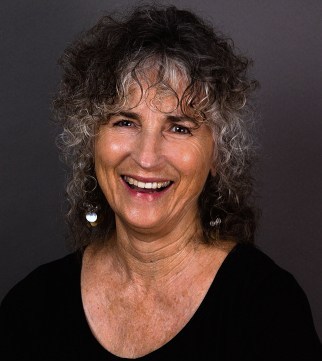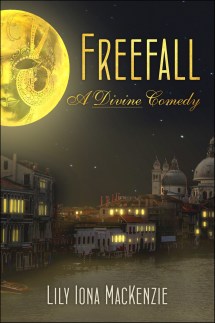FREEFALL: THE MAGIC OF AUTHOR LILY IONA MACKENZIE
Lily Iona Mackenzie’s new novel Freefall: A Divine Comedy is a “coming-of-age” novel about four women turning sixty. As a woman of “a certain age,” this concept naturally caught my attention. The story of “wacky installation artist” Tillie Bloom and three friends from her teenage years follows the women’s lives over four decades in three countries, centered in the San Francisco Bay area, Whistler, BC, and Venice, Italy. The result is an imaginative, sometimes “hilarious,” romp with a touch of magical realism that also turns out to be a serious meditation on the relationship between art and mortality.
Besides Freefall, Mackenzie has published reviews, interviews, short fiction, poetry, travel pieces, essays, and memoir in over 160 American and Canadian venues. Her novel Fling! was published in 2015 and another novel, Curva Peligrosa, in 2017. She also published a collection of her poetry, All This, in 2011.
In a recent interview, she shared some thoughts on Freefall and on her writing life more generally.
TZ: Freefall’s subtitle is A Divine Comedy. That makes sense to me: Dante’s epic poem of that same name also involves lots of travelling, and lots of soul-searching. Dante’s poem, however, has three parts: The Inferno, Purgatorio, and Paradiso. Did you see the four women in your novel as going through a similar time sequence, reaching a kind of paradise at the end of a hellish journey? Or did you mean to suggest a different process?
LIK: I actually wasn’t thinking about Dante’s poem when I wrote this novel. The title came to me much later, and then I realized the narrative was a kind of divine comedy, though I wasn’t trying to imitate Dante’s excellent work. To me it’s Divine because I believe that all life on earth is divine, and the comedy part Isn’t comic in the slapstick sense but in the humor that’s implicit in being human. We all face different challenges in our lives. If we’re lucky, we can see through the darkness to the wry aspect of how little control we have over anything.
We all face different challenges in our lives. If we’re lucky, we can see through the darkness to the wry aspect of how little control we have over anything.
Lily Iona Mackenzie
But the characters in Freefall, as those in Dante’s work, do travel, and they also do a fair amount of soul searching. And while they don’t reach a kind of paradise at the novel’s end, they have come to a new understanding of themselves and each other.
TZ: While we’re on the topic of great literature, “Tillie Bloom” immediately made me think of Molly Bloom in James Joyce’s Ulysses. Was that intentional? Tillie certainly “blooms” in other ways throughout the novel. Did you choose this striking name purposely?
LIK: Yes, I deliberately chose Bloom as Tillie’s last name. Tillie renames herself “Bloom” after reading Ulysses. She didn’t want her previous husband’s name, and she doesn’t have a father. So she chose Bloom because he lives so much in his senses. And just as Bloom is searching for a son, Tillie is searching for a father.
TZ: Freefall has more than a touch of magical realism in it. Is this a style you use in your other books? What attracts you to this style of writing?
LIK: Reality is both magical and “real,” if by real we mean something that isn’t imagined. Language by its very nature is magical, transforming our everyday reality in multiple ways, carrying us aloft on the wings of thought. When I call on magical realism in my fiction, I do it because it opens me up to a fuller understanding of our world, both internally and externally. I believe it captures a fuller view of what’s going on in our lives than realism can do.
TZ: You describe writing as “your addiction” and “compulsion,” but your website also features several of your watercolor paintings. Then, too, Tillie herself is an artist. Is visual art also a passion of yours? What does painting allow you to do that writing doesn’t, and vice versa?
LIK: If I could reincarnate, it would be BOTH as a visual and literary artist. What I produce when I’m playing with water color or acrylics or oils is not unlike what happens when I write poetry or prose. I start out with no expectations, no plan, and I follow wherever the unconscious leads me. I never know where I’ll end up, and that’s much of the pleasure for me in creating, whether as a visual artist or as a writer. In each case, I’m open to what I’ll discover and what will discover me. I’m passionate about art, and museums are my temples.
When I call on magical realism in my fiction, I do it because it opens me up to a fuller understanding of our world, both internally and externally. I believe it captures a fuller view of what’s going on in our lives than realism can do.
Lily Iona Mackenzie
TZ: In addition to writing yourself, you also teach and coach writing. What are the advantages of working with a private teacher/editor versus taking a class or joining a critique group?
LIK: In a class, at least how I teach it, students receive responses from multiple viewpoints (other class members), though they usually aren’t professional/trained writers. Therefore, the feedback can be uneven, and the writer needs to weigh each comment and decide for herself which ones seem to offer an opening into her work.
With a private teacher, you hope that s/he will be able to accommodate many different approaches to writing poetry/prose so s/he can offer a wide range of possibilities in his/her critiques. Otherwise, there’s a danger that the teacher/editor will abort whatever in the person as a writer is trying to bloom.
TZ: You have another novel about Tillie in the works, I believe. Will we be hearing more about Tillie and her re-found friends as they reach their seventies and beyond? Or just more about Tillie?
LIK: The followup to Freefall that I’m currently working on and will be published next year doesn’t involve an older Tillie but a much younger one. Yet your question makes me wonder if I need to consider writing a novel that follows these women into their seventies and beyond!
Tillie: Portraits of a Canadian Girl in Training is a Bildungsroman that takes the reader back to the ‘50s, to a world that flashes green and red lights at women. This novel starts with three year old Tillie and follows her until she’s seventeen and struggling to find her place in the world.
Terra Ziporyn
TERRA ZIPORYN is an award-winning novelist, playwright, and science writer whose numerous popular health and medical publications include The New Harvard Guide to Women’s Health, Nameless Diseases, and Alternative Medicine for Dummies. Her novels include Do Not Go Gentle, The Bliss of Solitude, and Time’s Fool, which in 2008 was awarded first prize for historical fiction by the Maryland Writers Association. Terra has participated in both the Bread Loaf Writers Conference and the Old Chatham Writers Conference and for many years was a member of Theatre Building Chicago’s Writers Workshop (New Tuners). A former associate editor of the Journal of the American Medical Association (JAMA), she has a PhD in the history of science and medicine from the University of Chicago and a BA in both history and biology from Yale University, where she also studied playwriting with Ted Tally. Her latest novel, Permanent Makeup, is available in paperback and as a Kindle Select Book.
- Web |
- More Posts(106)

